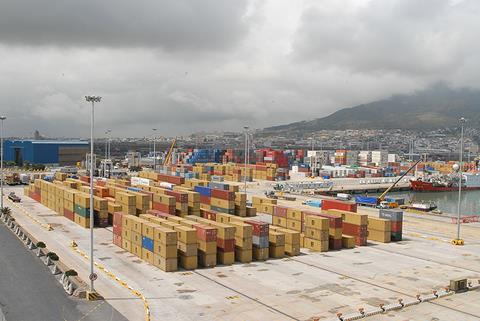Devastating storms and heavy rain have caused major disruption to exports from Cape Town in the Western Province of South Africa
After the extreme weather conditions seen over the past weeks, citrus growers in the Western Cape region started harvesting again this morning (15 July).

Citrus Growers’ Association (CGA) chairperson, Gerrit van der Merwe, said that by the end of the week fruit should be moved to the Port of Cape Town again to resume shipments.
What is not certain is how long it will take to repair the damage caused by the last ten days of storms in the Cape regions. The resulting floods have devastated supply routes and brought activities at the port to a standstill.
Most importantly, the town of Citrusdal in the Olifants River Valley, and along with it a substantial part of the citrus export crop, has for the third time in the last 18 months been cut off from the outside world.
The only alternative road via Ceres is not suitable to move heavy loads of fruit or, for that matter, to bring supplies to the town and the isolated community.
Local leaders have warned that unless urgent steps are taken, food shortages will be experienced in the Citrusdal region and large community of farms in the area.
Further afield, the main railway line between Johannesburg and Cape Town has been washed away near De Wet, between the Hex River Valley and Worcester.
All trains have been stopped at Beaufort West in the Karoo and observers said it would take weeks, if not months, to get the line repaired.
Roads in the area have also been affected, but it is not clear if it will affect shipments of containers of avocados and citrus from the north of the country to the Cape.
Movement of vessels in the port of Cape Town is expected to resume shortly after all activities were suspended for the last week because of strong winds and storm surges.
Van der Merwe said that the access road from the M-7 highway to Citrusdal was no longer a reliable route for the local town and the large fruit growing community it served.
“We must clearly find an alternative very quicklym” he said. ”There is an emergency road over private property, but much will have to be done in insurances and assurances from the government before it can be used. The government clearly also now needs to clear the rivers banks to allow flood water to flow down the river.”
Despite the delays in harvesting and shipping the industry was confident that it would be able to maintain supplies, Van der Merwe outlined.
”One vessel due to sail to the USA has been cancelled but if all goes well normal shipments will resume next week.”
In the Hex River Valley, where heavy rain and snow had been experienced, growers pointed out that it is winter and the cold would benefit the next crop.
The same is reported from Ceres and other deciduous growing regions in the Cape, where growers said as long as they did not have structural damage to roads and canals, the rain was good for the crop.
The last ten days have been the coldest experienced in the Cape for years and many see this as a welcome deviation from warmer winters experienced in recent times.



